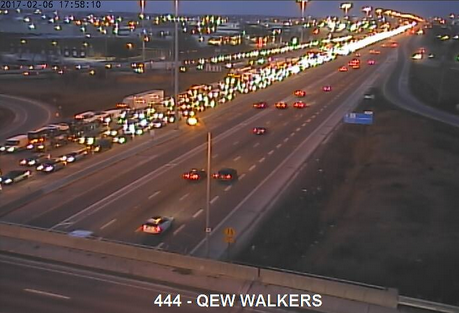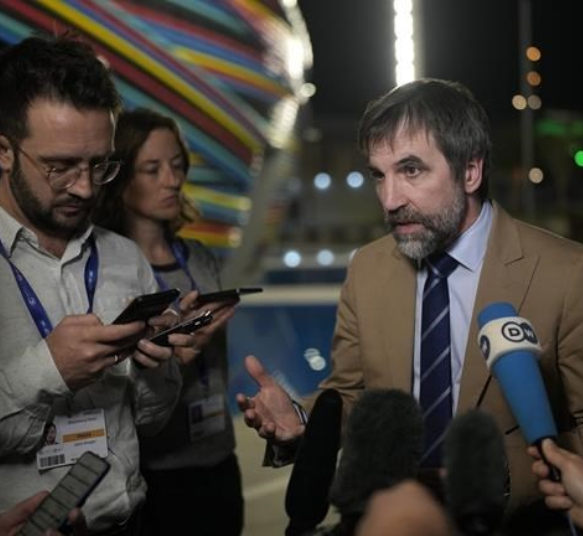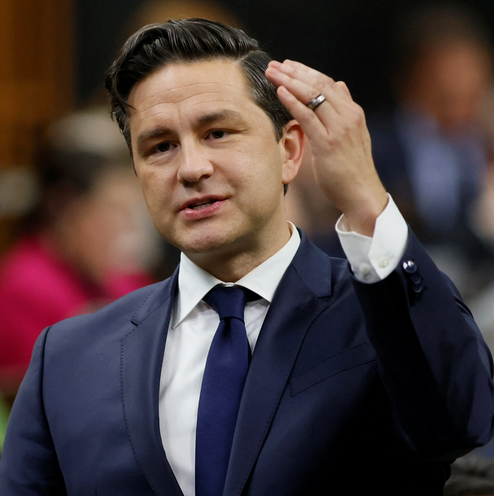 By Ray Rivers
By Ray Rivers
December 20th, 2021
BURLINGTON, ON
“transitioning away from fossil fuels in energy systems, in a just, orderly and equitable manner, accelerating action in this critical decade, so as to achieve net zero by 2050 in keeping with the science.” (COP28)

Journalists collecting hot air in Dubai at COP conference
Close to 100,000 people attended this year’s Congress of the Parties (COP) 28 extravaganza in Dubai to discus climate change. They came from around the globe but air travel from New York is estimated to be the equivalent in carbon emissions of not eating meat for almost 3 years according to one emissions site.
In fact one of those delegates could have taken the train 6.3 times around the globe for all the carbon emissions in that flight. So a lot of hot air was emitted just for people to attend and listen to much of what they’d heard at the 27 previous COP meetings. A more cynical person would say they could have helped the planet better by just staying home.
For decades, even before the first COP, Big Oil has been telling us that climate change is just a hoax – or at least nothing to worry about. So getting a real live oil sheik to say that the oil industry should transition away from fossil fuels is a big deal. Dr. Sultan Al Jaber, who chaired the COP meeting, is president of the one of the world’s largest energy companies. He is also the Minister of Industry and Advanced Technology and the UAE Special Envoy for Climate Change.
Canada’s Minister of Environment and Climate Change, Steven Guilbeault, who had spent much of pre-parliamentary life as an environmental activist, praised the results of this COP and claimed that Canada had played a solidifying role in the final release. And it has become the perfect jumping off point for the Trudeau government to further reduce the country’s carbon footprint.
Light motor vehicles only account directly for about 11 percent of Canadian GHG emissions. However the production of oil and gas to fill gas tanks accounts for another 22%, though some is also exported. That brings vehicle related emissions up to at least a full quarter of Canada’s climate related emissions. And eliminating those emissions all comes down to changing how we power our national vehicle fleet.

Can this problem be solved? If they were all electric cars – maybe?
After nearly a decade of failed policy on the environment, virtually all jurisdictions in the country (except Sask.) agreed to implement carbon pricing following the 2015 federal election. Carbon pricing increases the cost of fossil fuels such that smart consumers will be motivated to trade in their guzzlers for a more efficient ride, for example. Moreover, rising pump prices are a powerful signal to the auto industry to increase the availability of alternatively powered automobiles, something the industry dinosaurs have been reluctant to do.
So this week the federal government has introduced regulations with penalties and incentives for the auto sector that will require all new cars and light trucks to achieve zero emission by 2035. In a press conference Mr. Guilbeault, pointed out that Quebec and BC already have an equivalent 20% 2026 interim goal. And both jurisdictions have almost met that goal three years ahead of schedule.

Minister of Environment and Climate Change, Steven Guilbeault
Guilbeaut noted that China’s new EV sales are currently running around 40% of all vehicles with 10 million EVs already on its roads. EV sales in Norway, another northern country, now amount to 87%. Ontario’s EV sales got off to a good start but were stymied by the policies of the Ford government with its hostility to electrification. He eliminated all incentives for EV purchases shortly after coming to power in 2018.
Ford also removed a $2.5 million incentive program which helped homeowners install their own charging equipment, deleted electric vehicle charging station requirements in Ontario’s building code and ripped out public vehicle charging stations. Ironically, the vast majority of Canadian EV manufacturing is targeted for this province. One has to wonder how much of those lucrative Ontario and federal government industry subsidies had to do with compensating for the provincial anti-EV policy.
These new EV regulations go hand-in-hand with the environmental carbon tax. The Trudeau crowd has also drafted regulations to achieve zero emissions in electricity generation and to cap oil and gas production emissions. Finally, federal subsidies to big oil and gas are supposed to be terminated by the end of this year. Mind you, governments have been promising that as far back as when Mr. Harper was first PM in the early 2000’s, so don’t hold your breath.
Nailing down exactly how much of our public funds are wasted on fattening big oil’s coffers is a complicated business it seems. However, Environmental Defence figures that the federal government provided more than $20 billion in loans and financial support to oil and gas companies in 2022, including $12 billion for the TransMountain pipeline and $500 million for the Coastal GasLink Pipeline.
Federal Conservative Party leader, Pierre Poilievre is leading the charge to ‘axe the (carbon) tax’. He continues to argue that the carbon tax hurts those with lower incomes, when according to a recent study “94 per cent of households with incomes below $50,000 receive carbon tax rebates that exceed their carbon tax costs this year”. In fact about half of the households in this income category realize a net gain of between $20 and $40 a month.

Federal Conservative Party leader, Pierre Poilievre
Mr. Poilievre, in his time, has been a vocal critic of every environmental law or regulation the Trudeau government has brought forward, including, more recently, ones as benign as transitioning to green jobs and modernizing the rules governing green energy in Atlantic Canada. He voted against a free trade bill with Ukraine because of the mere mention of carbon pricing.
Voter fatigue with Kathleen Wynne and the other parties, as much as anything, gave us Mr. Ford, not only once but twice. And Mr Trudeau is seeing that in spades. According to a recent Nanos poll Canada’s Conservative Party is on track to decimate the Trudeau Liberals, winning a full majority if the election were held right now,
If Mr. Poilievre, is elected in the next election, would he bring the environmental house down as he implies he would? Would he tear up all of Canada’s climate change legislation, pretty much as Doug Ford did in Ontario? And what message would he take to his first COP meeting as PM?
 Ray Rivers is an economist and author who writes weekly on federal and provincial issues, applying his 25 years of involvement with federal and provincial ministries. Rivers’ involvement in city matters led to his appointment as founding chair of Burlington’s Sustainable Development Committee. He was also a candidate in a past provincial election. Tweet @rayzrivers
Ray Rivers is an economist and author who writes weekly on federal and provincial issues, applying his 25 years of involvement with federal and provincial ministries. Rivers’ involvement in city matters led to his appointment as founding chair of Burlington’s Sustainable Development Committee. He was also a candidate in a past provincial election. Tweet @rayzrivers
Background links:


















(the Guardian)The president of Cop28, Sultan Al Jaber, has claimed there is “no science” indicating that a phase-out of fossil fuels is needed to restrict global heating to 1.5C, the Guardian and the Centre for Climate Reporting can reveal.
Al Jaber also said a phase-out of fossil fuels would not allow sustainable development “unless you want to take the world back into caves”.
After Thirty posts by the international media I stopped counting, all stated that Cop28’ was watered down to allow for the continued use and phase out of fossil fuels. The argument that emerging markets have to use nineteenth century fuels to run their economies is ridiculous when they quite happily spending money on space exploration and high speed trains. Trudeau’s argument not to ship LNG to countries who are currently burning coal is also ridiculous.
I dread that the same electorate that gave Ford a majority will repeat this colossal mistake by voting in yet another loser at the federal level. If only the NDP & Liberals stopped splitting the vote … after all that’s what the PC did when they consolidated their ranks many years ago and landed us with Harper!
Oh, what a scary future that would be for our future generations. !!!